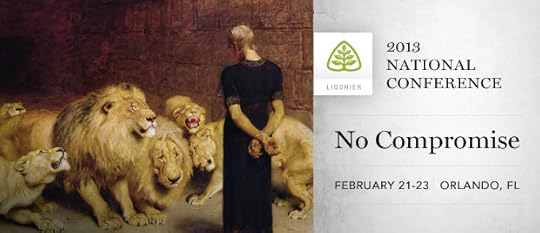R.C. Sproul's Blog, page 502
December 3, 2012
Why Attend Our 2013 National Conference?

Why do thousands of Christians gather each year in Orlando for sound teaching and godly fellowship? Watch and hear from those who have experienced a Ligonier National Conference and discover why we believe you should attend our 2013 National Conference February 21-23.
Even More Teaching
Our 2013 National Conference now has even more trustworthy teaching with the addition of optional sessions from Joel Beeke and Mark Jones, Anthony Carter, Steven Lawson, David Murray, and R.C. Sproul Jr.
Thursday's Optional Sessions
A Puritan Theology (Joel Beeke and Mark Jones)
Blood Work (Anthony Carter)
Friday's Optional Sessions
The Heroic Boldness of Martin Luther (Steven Lawson)
Christians Get Depressed Too (David Murray)
Economics for Everybody (R.C. Sproul Jr.)
Last Opportunity to Save $50
Our Early Bird Rate ends tomorrow. Register today and save $50.

$5 Friday: The Gospel, The Cross, The Tabernacle

It's time for our weekly $5 Friday sale. This week's resources cover such topics as the cross, the gospel, the tabernacle, music, theology, worldviews, and more. Thanks to Desiring God for parterning with us this week.
Sale runs through 12:01 a.m. — 11:59 p.m. Friday EST.
View today's $5 Friday sale items.

7 Ways to Live Positively in a Negative Culture

We live in an increasingly negative culture and it's easy to be dragged down with all the discouraging and depressing events that flood our hearts and overwhelm our minds.
I believe Christians have a huge opportunity to be counter-cultural missionaries in this dark day by demonstrating the positive power of the Gospel in their lives. But how is this possible? How do we maintain a positive life and witness in the face of so much negativity? Let me suggest seven areas to work on in our lives, in our families, and in our ministries:
1. More God than man: Keep God in the foreground rather than human beings. Think and talk more about God than about anyone else. Bring Him into every conversation and every area of your life. When human words and deeds are dragging you down, turn your thoughts towards God's gracious Word and God's glorious deeds.
2. More truth than lies: Although we must identify, expose, and warn about error, the greater proportion of our words should be about promoting the truth. There are so many lies around that we could easily spend all our time combatting them, only to find another seven appear for every one we decapitate. We, and those we minister to, need to hear God's truth positively expounded and applied.
3. More objective than subjective: I love to talk, write, read, and hear about the heights and depths of Christian experience. However, if our subjective experience begins to push out the objective facts of the gospel, we are doomed to sink. Sanctification is wonderful, but justification is even more wonderful.
4. More future than past: Christianity is a religion of history. Without the facts of history, we have no Christ to believe in and no cross to atone for our sins. We cannot look back at that history enough. However, we can often look back at our own personal history too much - a history of disappointing failure and deep frustration. That's why we have to keep a future orientation to our faith. The best truly is yet to be. We have a great hope waiting to be realized. Look forward more than backward.
5. More heaven than hell: As we look forward, two destinations rise on the horizon - heaven and hell. We cannot ignore or deny either reality. Thinking about both have a vital place in the Christian life and in motivating service and evangelism. However, if we are to maintain a positive outlook, our thoughts and words should be more taken up with heaven than hell. Is that true of your sermons, preacher?
6. More New Testament than Old Testament: I love the Old Testament and believe that it teaches the same way of salvation as the New Testament: salvation by grace alone through faith alone in God's promised Messiah alone. But, no matter how brightly the gospel shines there, relative to the New Testament it is still in the shadows. We can sometimes see more in the shadows than in the bright light, but as a rule we want to spend more time in the sun than in the shade.
7. More victory than struggle: If you are a preacher, what would a word cloud reveal about your view of the Christian life? Would the words "trial, suffering, struggle, persecution, backsliding, defeat, temptation, etc.," be in big font, while the words, "victory, growth, maturity, progress, usefulness, fruit, service, opportunity, advance, encouragement" be so small that they are unreadable? If so, don't be surprised if your hearers are mourning more than celebrating.
Notice that in all of the above it's not an "either/or" contrast I'm arguing for; it's a "more than" balance I'm aiming at. And I hope that these seven bullets will help you target and kill any negative imbalances in your life, allowing the positive gospel of grace to revive and refresh you; and many others through you too.

The Power of Preaching
Every Sunday morning we observe a strange phenomenon in our cities, towns, and villages. Millions of people leave their homes, take respite from their jobs and recreation, and gather in church buildings for services of worship. People sit quietly and listen while one person stands before them and gives a speech. We call the speech a sermon, homily, or meditation.
What's going on here?
The power of preaching is found in the Spirit working with the Word of God and through the Word of God. God promises that His Word will not return to Him void. Its power is located not in the eloquence or erudition of the preacher but in the power of the Spirit. Preaching is a tool in the hands of the Spirit of God. The Holy Spirit is a supernatural being, the third person of the Trinity. His presence in preaching is what makes it a supernatural event.
Salvation is a divine achievement. No man can save himself. God sovereignly ordains not only the end (salvation) but the means to the end (preaching). We conclude then that what is going on Sunday morning when the Word of God is truly preached is a divine drama of redemption.
Coram Deo: Thank God for the supernatural power of preaching that effected the drama of redemption in your life.

Twitter Highlights (12/2/12)
Here are highlights from our various Twitter accounts over the past week.
Church History II: Medieval Church is now available @ligonierconnect goo.gl/XqWIM Register for only $9/month for unlimited access
— Ligonier Connect (@LigonierConnect) November 27, 2012
There is no second death for the man who has been regenerated (Lloyd-Jones).
— Ligonier Academy (@LigonierAcademy) November 27, 2012
The Frank Sinatra phrase "I did it my way" still expresses the sentiment of the rebellious human heart. —Michael Horton bit.ly/kHgI54
— Reformation Trust (@RefTrust) November 28, 2012
The story is about Him and His glory more than us and our comfort. —@rcsprouljr ligm.in/QNnirB
— Ligonier Ministries (@Ligonier) November 29, 2012
Prospective college students are invited to a brunch with faculty & the @ligonier National Conference February 21-23 wp.me/pZsr9-16m
— RefBibleCollege (@RefBibleCollege) November 29, 2012
...there are only two ways of dying. We can die in faith or we can die in our sins. —R.C. Sproul bit.ly/lCuaCY
— Reformation Trust (@RefTrust) November 29, 2012
Good education is not regeneration. Education may chain up men's lusts, but cannot change their hearts (Thomas Boston).
— Tabletalk Magazine (@Tabletalk) November 30, 2012
...the real barometer of who we are is reflected in what we do when no one else is looking. —@johnmacarthur
— Ligonier Ministries (@Ligonier) December 1, 2012
You can also find our various ministries on Facebook:
Ligonier Ministries | Ligonier Academy | Ligonier Connect | RefNet
Reformation Bible College | Reformation Trust | Tabletalk Magazine

Christmas Carols: O Come, O Come, Emmanuel

Of the many beautiful hymns that have been composed in celebration of the birth of Christ, few in my mind equal the depth of O Come, O Come, Emmanuel. The origins of the Latin version Veni, Emmanuel are obscure. It may have been composed as early as the 8th century. The melody appears to have originated in France in the 15th century. The hymn was translated into English by the Reverend John Mason Neale in the mid 19th century. The English version originally consisted of five verses, which began "Draw nigh, draw nigh, Emmanuel." Alernate versions of most of the verses and additional verses were composed later, and one can now find numerous versions of this hymn.
While the origins of the hymn and its development over time are interesting matters, they are not the reasons for the hymn's profundity. That rests on the subject matter. The hymn is based on a prophecy in Isaiah 7, a prophecy that looks forward to the birth of a child who will be named Immanuel, which means "God with us." In Eden, God had been present with mankind, but as a result of the Fall, man was exiled from God's presence. From that point forward, the restoration of God's presence with man become a major theme that is developed throughout Scripture.
God chooses Israel as the people through whom He will reestablish His presence with man, and this begins in earnest with the construction of the tabernacle in the wilderness and later the temple in Jerusalem. God dwells in the midst of His holy people, but only the high priest is allowed into God's direct presence and that only once a year. At the time of the exile, Ezekiel sees God's presence depart from the temple as a result of the people's sin, but he and the other prophets look forward to a time when God will restore His presence with His people in a way that transcends the temple built with hands. Isaiah's prophecy of the child called Immanuel hints at this.
And then, in the fullness of time, Jesus is born, and Matthew tells us that His birth took place to fulfill what the Lord had spoken through the prophet Isaiah (Matt. 1:23). Jesus is Immanuel. He is God with us. In Him all of the Old Testament types and promises that looked forward to the restoration of God's presence with His people are fulfilled. Jesus is the Son of God incarnate.
The words of the hymn express the hopes of Israel throughout her history for the fulfillment of Isaiah's promise. We as Christians can now look back to the fulfillment of those promises – to the most incredible, awe-inspiring moment in history, the birth of Immanuel, the incarnation of the Son of God Himself. In Jesus God established His presence once again with His people, and He is with us always – to the end of the age. Rejoice!

November 28, 2012
Romans Commentary: Yours for a Gift of Any Amount
Recently, I was asked this question: Why is the book of Romans important for the church today and for you personally?
I know where the question came from as I've taught verse by verse through Romans at least four times, and I've written extensively on themes from Romans. It has been a defining book for me.
There are many answers I could give as to why the book has been so defining for me and for the church. Historically, Romans has been used of God to spark the Protestant Reformation and encourage missions and evangelism. Also, Romans 1 is the foundation for Christian apologetics, one of our key themes here at Ligonier. Romans also addresses nearly every issue of practical Christian living and proclaims clearly the doctrines of grace.
But the most important reason why Christians need to be deeply grounded in the content of Romans is that the epistle gives us the most comprehensive exposition of biblical theology anywhere in Scripture. It provides the deepest and broadest teaching on the essence of the gospel—what it is and how its benefits are appropriated to the individual.
We long to see people everywhere transformed by Romans and the gospel therein. Thus, we have a special offer for you: For a gift of any amount, we will send you a copy of my expositional commentary on Romans.
Christopher from Kentucky said this about the Romans commentary:
With each page, I can hear Dr. Sproul thundering from the pulpit: "The righteous shall live by faith!" R.C. teaches with such clarity that the reader is made to feel as if he were seated in Saint Andrew's Chapel and experiencing the exposition first-hand. This work is sanctifying, timeless, and counted among my most treasured volumes.
This is humbling and encouraging. Ligonier Ministries exists to preach the world-changing gospel of God. This gospel is our only hope, and we want to help people grow in their faith. But we need friends like you to stand with us to accomplish our mission. Can you help us this month? Thank you.
Offer expires 12/31/12. Please allow up to 6 weeks for delivery after your gift is processed. Contributions are tax-deductible as allowed by law. For federal income tax purposes, the deductible portion of your charitable contribution is limited to the excess of the money contributed over the value of the goods provided. Our good faith estimate of the value of this resource is $33. Offer valid in U.S. and Canada only. Thank you for your support.

TULIP and Reformed Theology: Irresistible Grace

In historic Reformation thought, the notion is this: regeneration precedes faith. We also believe that regeneration is monergistic. Now that's a three-dollar word. It means essentially that the divine operation called rebirth or regeneration is the work of God alone. An erg is a unit of labor, a unit of work. The word energy comes from that idea. The prefix mono- means "one." So monergism means "one working." It means that the work of regeneration in the human heart is something that God does by His power alone—not by 50 percent His power and 50 percent man's power, or even 99 percent His power and 1 percent man's power. It is 100 percent the work of God. He, and He alone, has the power to change the disposition of the soul and the human heart to bring us to faith.
In addition, when He exercises this grace in the soul, He brings about the effect that He intends to bring about. When God created you, He brought you into existence. You didn't help Him. It was His sovereign work that brought you to life biologically. Likewise, it is His work, and His alone, that brings you into the state of rebirth and of renewed creation. Hence, we call this irresistible grace. It's grace that works. It's grace that brings about what God wants it to bring about. If, indeed, we are dead in sins and trespasses, if, indeed, our wills are held captive by the lusts of our flesh and we need to be liberated from our flesh in order to be saved, then in the final analysis, salvation must be something that God does in us and for us, not something that we in any way do for ourselves.
God's grace is so powerful that it has the capacity to overcome our natural resistance to it. —R.C. Sproul
However, the idea of irresistibility conjures up the idea that one cannot possibly offer any resistance to the grace of God. However, the history of the human race is the history of relentless resistance to the sweetness of the grace of God. Irresistible grace does not mean that God's grace is incapable of being resisted. Indeed, we are capable of resisting God's grace, and we do resist it. The idea is that God's grace is so powerful that it has the capacity to overcome our natural resistance to it. It is not that the Holy Spirit drags people kicking and screaming to Christ against their wills. The Holy Spirit changes the inclination and disposition of our wills, so that whereas we were previously unwilling to embrace Christ, now we are willing, and more than willing. Indeed, we aren't dragged to Christ, we run to Christ, and we embrace Him joyfully because the Spirit has changed our hearts. They are no longer hearts of stone that are impervious to the commands of God and to the invitations of the gospel. God melts the hardness of our hearts when He makes us new creatures. The Holy Spirit resurrects us from spiritual death, so that we come to Christ because we want to come to Christ. The reason we want to come to Christ is because God has already done a work of grace in our souls. Without that work, we would never have any desire to come to Christ. That's why we say that regeneration precedes faith.
I have a little bit of a problem using the term irresistible grace, not because I don't believe this classical doctrine, but because it is misleading to many people. Therefore, I prefer the term effectual grace, because the irresistible grace of God effects what God intends it to effect.
In the final post, we will conclude by considering the P in TULIP, perseverance of the saints.
See also:
TULIP and Reformed Theology: An Introduction
TULIP and Reformed Theology: Total Depravity
TULIP and Reformed Theology: Unconditional Election
TULIP and Reformed Theology: Limited Atonement
TULIP and Reformed Theology: Irresistible Grace
Scriptures for further study: John 10:3, 4; 11:38–46; Galatians 1:15; Revelation 22:17

November 27, 2012
The Call to Ministry
Here's an excerpt from The Call to Ministry, Geoffrey Thomas' contribution to the November issue of Tabletalk.
Who will possibly stay in a relationship with a girlfriend or boyfriend “until death us do part” unless there is a deep devotion to that one person above all others, a commitment that is based on comprehensive knowledge and respect? That is the essence of marriage, leaving all others and cleaving to one until God shall separate by death.
Who will stay in the Christian ministry for one’s entire working life unless one loves this work above all others, being unable to do anything else than preach the gospel and pastor the people of God to whom he preaches week by week? The Apostle Paul writes about a man who “sets his heart” on this work (1 Tim. 3:1). He is stretching out to make this his life’s supreme calling. He is not talking about selfish ambition for prestige and power but for the high privilege of caring for the people whom the Son of God loved and for whom He suffered the death of the cross. So the first qualification for a lifetime’s commitment to pastoral ministry is a strong inner desire. Our life is offered to God in building up His people and going after the lost until they all, with you, attain the stature of the fullness of Christ.
Continue reading the eight reasons in The Call to Ministry online or get the Tabletalk app and read it on your iPad for free.

Early Bird Rate for Our 2013 National Conference Ends Friday

"Now, perhaps more than ever before, we must stand with conviction. We live in age of compromise, but if we stand on the bedrock of God's truth, we will not bend with the winds of relativism and faithlessness." —R.C. Sproul
On February 21-23, 2013, we will be hosting our annual conference in Orlando, Florida. R.C. Sproul will be joined by Alistair Begg, Sinclair Ferguson, Robert Godfrey, Steve Lawson, R.C. Sproul Jr., Cal Thomas, and Ravi Zacharias to consider the theme "No Compromise: Standing for the Truth of God's Word." They will examine the Word of God and what it says about standing firm for bedrock truths such as the resurrection of Christ, the trustworthiness of Scripture, God's plan for the family, our need to show mercy, the importance of theology, the primacy of preaching, the exclusivity of Jesus, the place of the church, our call to be on the offense against the city of man, and the final victory of Christ and His people. As always, this promises to be an encouraging time of study.
Early Bird Rate ends Friday, November 30, 2012.

R.C. Sproul's Blog
- R.C. Sproul's profile
- 1932 followers





